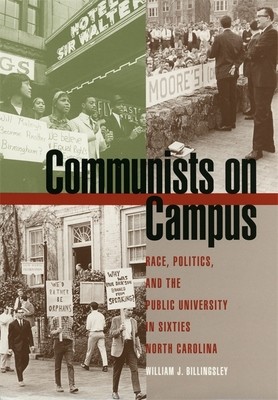
- We will send in 10–14 business days.
- Author: William Billingsley
- Publisher: University of Georgia Press
- ISBN-10: 0820352209
- ISBN-13: 9780820352206
- Format: 15.2 x 22.9 x 2.2 cm, hardcover
- Language: English
- SAVE -10% with code: EXTRA
Reviews
Description
North Carolina's 1963 speaker ban law declared the state's public college and university campuses off-limits to "known members of the Communist Party" or to anyone who cited the Fifth Amendment in refusing to answer questions posed by any state or federal body. Oddly enough, the law was passed in a state where there had been no known communist activity since the 1950s. Just which "communists" was it attempting to curb? In Communists on Campus, William J. Billingsley bares the truth behind the false image of the speaker ban's ostensible concern. Appearing at a critical moment in North Carolina and U.S. history, the law marked a last-ditch effort by conservative rural politicians to increase conservative power and quell the demands of the civil rights movement, preventing the feared urban political authority that would accompany desegregation and African American political participation. Questioning the law's discord with North Carolina's progressive reputation, Billingsley also criticizes the school officials who publicly appeared to oppose the speaker ban law but, in reality, questioned both students' rights to political opinions and civil rights legislation. Exposing the University of North Carolina at Chapel Hill as the main target of the ban, he addresses the law's intent to intimidate state schools into submission to reactionary legislative demands at the expense of the students' political freedom.
Contrary to its aims, the speaker ban law spawned a small but powerfully organized student resistance led by the Students for a Democratic Society at the University of North Carolina. The SDS, quickly joined by more traditional student groups, mobilized student "radicals" in a memorable effort to halt this breach of their constitutional rights. Highlighting the crisis point of the civil rights movement in North Carolina, Communists on Campus exposes the activities and machinations of prominent political and educational figures Allard Lowenstein, Terry Sanford, William Friday, Herbert Aptheker, and Jesse Helms in an account that epitomizes the social and political upheaval of sixties America.EXTRA 10 % discount with code: EXTRA
The promotion ends in 16d.12:54:29
The discount code is valid when purchasing from 10 €. Discounts do not stack.
- Author: William Billingsley
- Publisher: University of Georgia Press
- ISBN-10: 0820352209
- ISBN-13: 9780820352206
- Format: 15.2 x 22.9 x 2.2 cm, hardcover
- Language: English English
North Carolina's 1963 speaker ban law declared the state's public college and university campuses off-limits to "known members of the Communist Party" or to anyone who cited the Fifth Amendment in refusing to answer questions posed by any state or federal body. Oddly enough, the law was passed in a state where there had been no known communist activity since the 1950s. Just which "communists" was it attempting to curb? In Communists on Campus, William J. Billingsley bares the truth behind the false image of the speaker ban's ostensible concern. Appearing at a critical moment in North Carolina and U.S. history, the law marked a last-ditch effort by conservative rural politicians to increase conservative power and quell the demands of the civil rights movement, preventing the feared urban political authority that would accompany desegregation and African American political participation. Questioning the law's discord with North Carolina's progressive reputation, Billingsley also criticizes the school officials who publicly appeared to oppose the speaker ban law but, in reality, questioned both students' rights to political opinions and civil rights legislation. Exposing the University of North Carolina at Chapel Hill as the main target of the ban, he addresses the law's intent to intimidate state schools into submission to reactionary legislative demands at the expense of the students' political freedom.
Contrary to its aims, the speaker ban law spawned a small but powerfully organized student resistance led by the Students for a Democratic Society at the University of North Carolina. The SDS, quickly joined by more traditional student groups, mobilized student "radicals" in a memorable effort to halt this breach of their constitutional rights. Highlighting the crisis point of the civil rights movement in North Carolina, Communists on Campus exposes the activities and machinations of prominent political and educational figures Allard Lowenstein, Terry Sanford, William Friday, Herbert Aptheker, and Jesse Helms in an account that epitomizes the social and political upheaval of sixties America.

Reviews